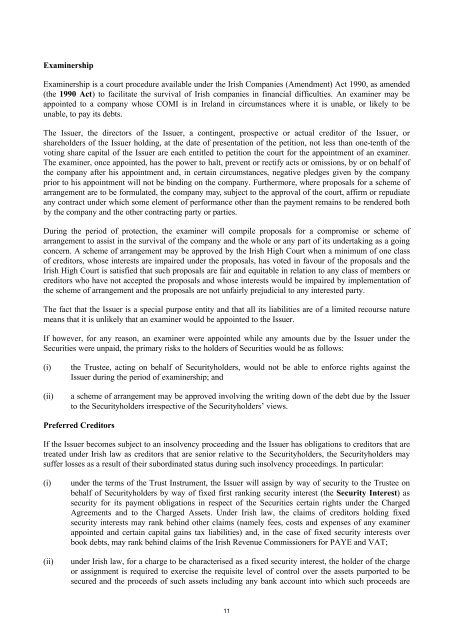SUPPLEMENTAL INFORMATION MEMORANDUM XENON ...
SUPPLEMENTAL INFORMATION MEMORANDUM XENON ...
SUPPLEMENTAL INFORMATION MEMORANDUM XENON ...
You also want an ePaper? Increase the reach of your titles
YUMPU automatically turns print PDFs into web optimized ePapers that Google loves.
Examinership<br />
Examinership is a court procedure available under the Irish Companies (Amendment) Act 1990, as amended<br />
(the 1990 Act) to facilitate the survival of Irish companies in financial difficulties. An examiner may be<br />
appointed to a company whose COMI is in Ireland in circumstances where it is unable, or likely to be<br />
unable, to pay its debts.<br />
The Issuer, the directors of the Issuer, a contingent, prospective or actual creditor of the Issuer, or<br />
shareholders of the Issuer holding, at the date of presentation of the petition, not less than one-tenth of the<br />
voting share capital of the Issuer are each entitled to petition the court for the appointment of an examiner.<br />
The examiner, once appointed, has the power to halt, prevent or rectify acts or omissions, by or on behalf of<br />
the company after his appointment and, in certain circumstances, negative pledges given by the company<br />
prior to his appointment will not be binding on the company. Furthermore, where proposals for a scheme of<br />
arrangement are to be formulated, the company may, subject to the approval of the court, affirm or repudiate<br />
any contract under which some element of performance other than the payment remains to be rendered both<br />
by the company and the other contracting party or parties.<br />
During the period of protection, the examiner will compile proposals for a compromise or scheme of<br />
arrangement to assist in the survival of the company and the whole or any part of its undertaking as a going<br />
concern. A scheme of arrangement may be approved by the Irish High Court when a minimum of one class<br />
of creditors, whose interests are impaired under the proposals, has voted in favour of the proposals and the<br />
Irish High Court is satisfied that such proposals are fair and equitable in relation to any class of members or<br />
creditors who have not accepted the proposals and whose interests would be impaired by implementation of<br />
the scheme of arrangement and the proposals are not unfairly prejudicial to any interested party.<br />
The fact that the Issuer is a special purpose entity and that all its liabilities are of a limited recourse nature<br />
means that it is unlikely that an examiner would be appointed to the Issuer.<br />
If however, for any reason, an examiner were appointed while any amounts due by the Issuer under the<br />
Securities were unpaid, the primary risks to the holders of Securities would be as follows:<br />
(i)<br />
(ii)<br />
the Trustee, acting on behalf of Securityholders, would not be able to enforce rights against the<br />
Issuer during the period of examinership; and<br />
a scheme of arrangement may be approved involving the writing down of the debt due by the Issuer<br />
to the Securityholders irrespective of the Securityholders’ views.<br />
Preferred Creditors<br />
If the Issuer becomes subject to an insolvency proceeding and the Issuer has obligations to creditors that are<br />
treated under Irish law as creditors that are senior relative to the Securityholders, the Securityholders may<br />
suffer losses as a result of their subordinated status during such insolvency proceedings. In particular:<br />
(i)<br />
(ii)<br />
under the terms of the Trust Instrument, the Issuer will assign by way of security to the Trustee on<br />
behalf of Securityholders by way of fixed first ranking security interest (the Security Interest) as<br />
security for its payment obligations in respect of the Securities certain rights under the Charged<br />
Agreements and to the Charged Assets. Under Irish law, the claims of creditors holding fixed<br />
security interests may rank behind other claims (namely fees, costs and expenses of any examiner<br />
appointed and certain capital gains tax liabilities) and, in the case of fixed security interests over<br />
book debts, may rank behind claims of the Irish Revenue Commissioners for PAYE and VAT;<br />
under Irish law, for a charge to be characterised as a fixed security interest, the holder of the charge<br />
or assignment is required to exercise the requisite level of control over the assets purported to be<br />
secured and the proceeds of such assets including any bank account into which such proceeds are<br />
11
















